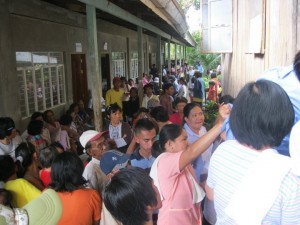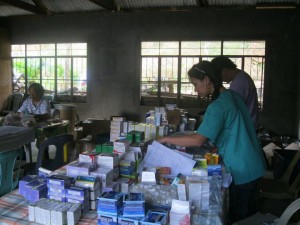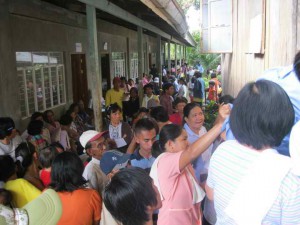By ARTHA KIRA PAREDES

EVEN if they are thousands of miles away, overseas members of Abra indigenous peoples (IPs) are actively involved in a virtual community that uses the ancient, indigenous practice of dap-ay and the social networking site Facebook to help their fellow Maengs in this northern province.
Dap-ay di I-Maeng (Dap-ay of Maeng), a Facebook page composed of members of the Maeng indigenous people, includes overseas workers who sponsor and raise funds for feeding programs, medical missions, and medical equipment for schools and barangay health units in their respective towns.
The four Maeng towns include Tubo, Luba, Villaviciosa and Manabo. Maeng is one of the 10 IPs in Abra collectively known as Tingguian.
Dap-ay is the Maeng’s system of governance that dates back to the 16th century, according to the Ancestral Domain Sustainable Development Protection Plan (ADSDPP) 2004-2014 of Tubo. The system manages and directs the “social-economic, cultural and spiritual life of the people in a community.”
Dap-ay di I-Maeng, which is classified as a non-profit organization on facebook, was set up in mid-2010. To date it has already 572 likes. Some of the countries where oversees members are based include Canada, France, Russia, Greece, United States, Lebanon and Hong Kong.
The site serves as a venue of discussions and debates, source of news, promotion of cultural values, projects and group camaraderie. The page also serves as a monitoring tool that ensures transparency. Receipts are posted as well as photos of the most recent outreach, status of donations and turnover of materials and equipment.
Dap-ay di I-Maeng, in partnership with nongovernment organization Sinbayan Tako (United Family) Inc., has so far distributed 27 industrial weighing scales in schools and clinics in Abra’s four towns, and completed a 20-day feeding program for 125 children in Lul-luno, Luba.
 Its first medical-dental mission in Luba, which was achieved through the assistance of Pastor Donald Soriano and the Bethesda Ministries Mission, has benefitted from 550 to 600 people.
Its first medical-dental mission in Luba, which was achieved through the assistance of Pastor Donald Soriano and the Bethesda Ministries Mission, has benefitted from 550 to 600 people.
This June, it will distribute basic school supplies, such as back packs and pencils, to at least 500 kids this June.
Pledges have so far amounted to P341,158.72, almost half of which (P166,338.72) has already been collected.
Philip Tingonong, provincial planning and development officer, describes the Maeng as a variation of the Kan-kanaey of Mountain Province, which borders southern Abra where the four Maeng towns are located.
Ivy Cabanday-Coryaen, who has roots in Luba, Manabo and Villaviciosa and has been living in Canada for almost 21 years now, is one of the two co-founders of the group.
Coryaen, now a Canadian citizen, said the group decided to focus on health and education because “when people are sick and hungry, they don’t really care much for anything else happening around them.”
“If we can somehow alleviate immediate concerns like health and education, we will have people more likely to have more concern about what’s happening around them,” she said.
Plans to start a “philanthropic group” have been in the drawing board for years but it was when Coryaen and her France-based cousin Famela Belino-Cuntapay discovered that they have the same vision that the group officially started.
Cuntapay, who is from Tubo, said that one of her “greatest” dreams is to serve her own people “even in a simple way.”
“Wherever I am now, my one foot is always back home,” she said. According to her, they decided to use the social networking site FB “to give opportunity to our fellow Kamaengans to voice out their opinions, and assist in obtaining medical and school supplies for children.
Although donors are OFWs, volunteers are locals “who give their time without pay,” Coryaen said. “To me, that’s worth more than the donations of cash,” she added.
“The DepEd (Department of Education) teachers help us tremendously, and the doctor and nurses in Luba give their time for free,” when supplies need to be purchased and distributed, Coryaen said.
Coryaen said they plan to eventually extend help to other municipalities and to convert the group into a non-profit corporation.
Jun Belino Jr, president of local NGO partner Sinbayan Tako founded in 1998, said the teachers have also helped them decide on which medical equipment to prioritize.
“They couldn’t determine if children are malnourished because they do not have equipment,” he said in explaining the reason for purchasing weighing scales first.
Security and Exchange Commission (SEC) records of this NGO based in Tubo show that among the objectives of Sinbayan are to “improve social and/or economic well-being of the people,” to assist the community through “medical, dental care, transportation, housing, communication, labor, irrigation, market management, janitorial services” and “promotion and preservation” of the Maeng customs and traditions.
The National Statistical Coordination Board (NSCB) estimated in 2009 that 30 to 40 percent of families in Abra are poor. The province is populated by Ilocanos and Tingguians. Some 34 percent of its 250, 953 population are Tingguians.
